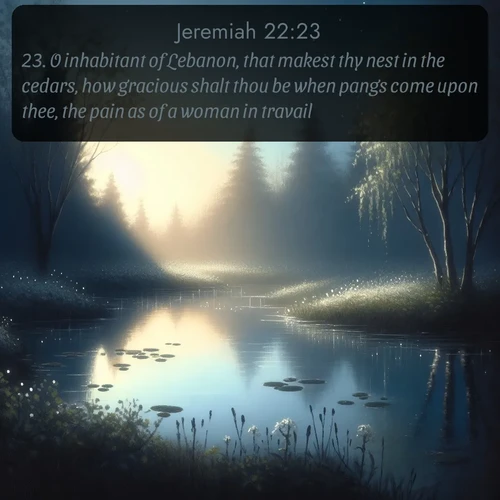Jeremiah 22:23 plusieurs versions / traductions
English Bible Translations
23. O inhabitant of Lebanon, that makest thy nest in the cedars, how gracious shalt thou be when pangs come upon thee, the pain as of a woman in travail!
23. O inhabitant of Lebanon, that makest thy nest in the cedars, how greatly to be pitied shalt thou be when pangs come upon thee, the pain as of a woman in travail!
23. O you who are living in Lebanon, making your living-place in the cedars, how greatly to be pitied will you be when pains come on you, as on a woman in childbirth!
23. Thou inhabitress of Lebanon, that makest thy nest in the cedars, how pitiful shalt thou be when pangs come upon thee, pain as of a woman in travail!
23. O inhabitant of Lebanon, that makest thy nest in the cedars, how gracious shalt thou be when pangs come upon thee, the pain as of a woman in travail!
23. O dweller in Lebanon, making a nest among cedars, How gracious hast thou been when pangs come to thee, Pain -- as of a travailing woman.
German Bible Translations
23. Die du jetzt auf dem Libanon wohnest und in Zedern nistest, wie schön wirst du sehen, wenn dir Schmerzen und Wehen kommen werden wie einer in Kindsnöten!
23. Die du jetzt auf dem Libanon wohnst und auf Zedernbäumen nistest, wie wirst du stöhnen, wenn dich Wehen ankommen werden, Krämpfe wie eine, die gebären soll!
French Bible Translations
23. Toi qui habites sur le Liban, qui as ton nid dans les cèdres, combien tu gémiras quand les souffrances t'atteindront, des douleurs pareilles à celles d'une femme prête à accoucher!
23. Toi qui habites sur le Liban, Qui as ton nid dans les cèdres, Combien tu gémiras quand les douleurs t’atteindront, Douleurs semblables à celles d’une femme en travail!
23. Toi qui habites sur le Liban, Qui as ton nid dans les cèdres, Combien tu gémiras quand les douleurs t'atteindront, Douleurs semblables à celles d'une femme en travail!
23. Habitante du Liban, qui fais ton nid dans les cèdres, combien tu seras un objet de pitié quand les douleurs viendront sur toi, l'angoisse comme celle d'une femme qui enfante!
23. Tu te tiens au Liban, et tu fais ton nid dans les cèdres, ô que tu seras un objet de compassion quand les tranchées te viendront, [et] ta douleur, comme de la femme qui est en travail d'enfant.
23. Toi qui habites le Liban et qui fais ton nid dans les cèdres, que tu seras à plaindre quand te surviendront les douleurs et l'angoisse, comme à la femme en travail!
Versions with Strong Codes
Jeremiah 22 / KJV_Strong23.
Strong Code definitions
H3427 yashab yaw-shab' a primitive root; properly, to sit down (specifically as judge. in ambush, in quiet); by implication, to dwell, to remain; causatively, to settle, to marry:--(make to)abide(-ing), continue, (cause to, make to) dwell(-ing), ease self, endure, establish, X fail, habitation, haunt, (make to) inhabit(-ant), make to keep (house), lurking, X marry(-ing), (bring again to) place, remain, return, seat, set(- tle),(down-)sit(-down, still, -ting down, -ting (place) -uate), take, tarry.
H3844 Lbanown leb-aw-nohn' from H3825; (the) white mountain (from its snow); Lebanon, a mountain range in Palestine:--Lebanon.see H3825
H7077 qanan kaw-nan' a primitive root; to erect; but used only as denominative from H7064; to nestle, i.e. build or occupy as a nest:-- make...nest.see H7064
H730 'erez eh-rez' from H729; a cedar tree (from the tenacity of its roots):--cedar (tree).
H4100 mah maw or mah {mah}; or ma {maw}; or ma {mah}; also meh {meh}; a primitive particle; properly, interrogative what? (including how? why? when?); but also exclamation, what! (including how!), or indefinitely what (including whatever, and even relatively, that which); often used with prefixes in various adverbial or conjunctive senses:--how (long, oft, (-soever)), (no-)thing, what (end, good, purpose, thing), whereby(-fore, -in, -to, -with), (for) why.
H2603 chanan khaw-nan' a primitive root (compare 2583); properly, to bend or stoop in kindness to an inferior; to favor, bestow; causatively to implore (i.e. move to favor by petition):--beseech, X fair, (be, find, shew) favour(-able), be (deal, give, grant (gracious(-ly), intreat, (be) merciful, have (shew) mercy (on, upon), have pity upon, pray, make supplication, X very.see H2583
H2256 chebel kheh'-bel or chebel {khay'-bel}; from H2254; a rope (as twisted), especially a measuring line; by implication, a district or inheritance (as measured); or a noose (as of cords); figuratively, a company (as if tied together); also a throe (especially of parturition); also ruin:--band, coast, company, cord, country, destruction, line, lot, pain, pang, portion, region, rope, snare, sorrow, tackling.see H2254
H935 bow' bo a primitive root; to go or come (in a wide variety of applications):--abide, apply, attain, X be, befall, + besiege, bring (forth, in, into, to pass), call, carry, X certainly, (cause, let, thing for) to come (against, in, out, upon, to pass), depart, X doubtless again, + eat, + employ, (cause to) enter (in, into, -tering, -trance, -try), befallen, fetch, + follow, get, give, go (down, in, to war), grant, + have, X indeed, (in-)vade, lead, lift (up), mention, pull in, put, resort, run (down), send, set, X (well) stricken (in age), X surely, take (in), way.
H2427 chiyl kheel and (feminine) chiylah {khee-law'}; from H2342; a throe (expectant of childbirth):--pain, pang, sorrow.see H2342
H3205 yalad yaw-lad' a primitive root; to bear young; causatively, to beget; medically, to act as midwife; specifically, to show lineage:--bear, beget, birth((-day)), born, (make to) bring forth (children, young), bring up, calve, child, come, be delivered (of a child), time of delivery, gender, hatch, labour, (do the office of a) midwife, declare pedigrees, bethe son of, (woman in, woman that) travail(-eth, -ing woman).
Prédications qui analysent les thèmes Jérémie 22
Thèmes : Message contre Juda; Promesse de rétablissementRelated Sermons discussing Jeremiah 22
Themes : Message contre Juda; Promesse de rétablissementsee also: Bible Key Verses ; KJV Bible Images, BBE Bible images

